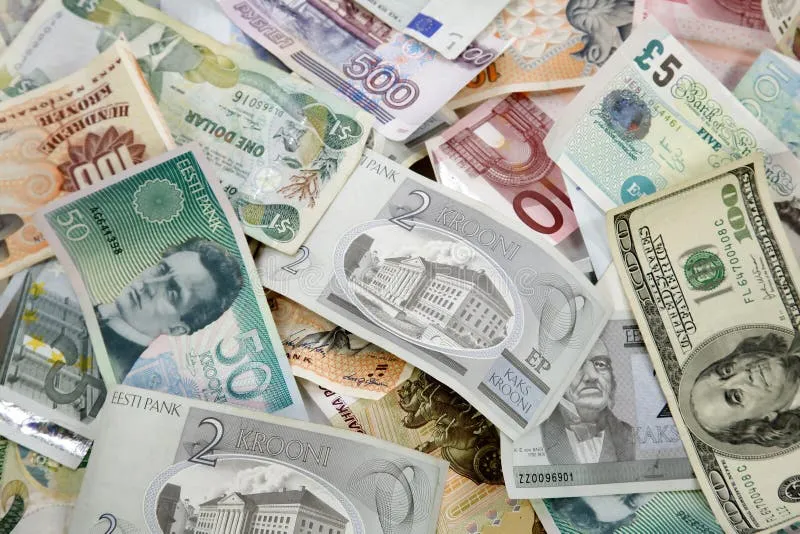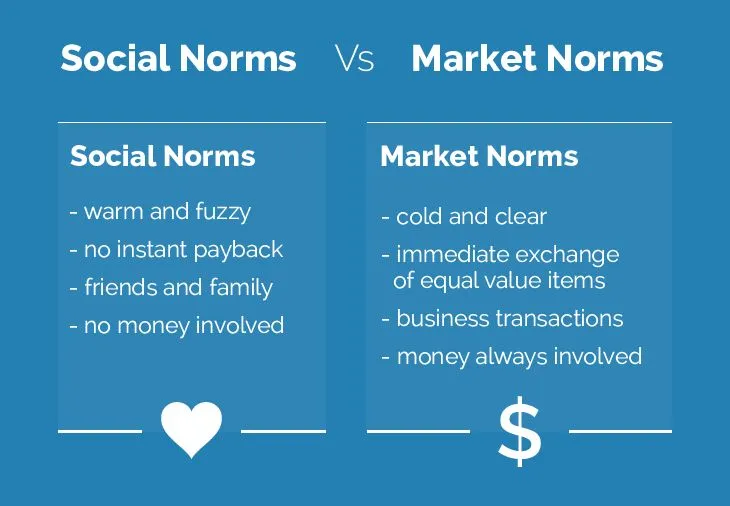
Most of us are interested in making money. Sure there's the saying "who doesn't like money?" Of course it's necessary to have and represents a free market system but is it changing your behavior or beliefs to obtain it?
Money can influence the way you think or act toward others. We constantly edify those that are considered rich and change our behavior towards others to gain respect and have a better view of ourselves. It has been pointed out that money is an incentive and motivates a person to attain personal goals and become more productive in society.
Social vs Business Market Norms

In 2004, a study was done to see the psychological effects between social and business market norms. In the experiment, a computer was setup to show a circle on the left of the screen and a box on the right. The task was to drag the circle onto the box and the circle would disappear and a new one would appear back on the left of the screen. They would repeat this process for 5 minutes and the participants had to drag as many circles as they could. This was to measure the amount of effort participants would put into this task.
One group of participants were given 5 dollars for participating in the experiment. The money was given to them as the walked in and they were told that the task will take 5 minutes and would be alerted when it's done.
The second group were given 50 cents and were given the same instructions.
The third group was not offered anything. Money was not mentioned to the group and and was just asked as a favor to do the same task.
The results were interesting. The group that received 5 dollars dragged and average of 159 circles, and the group that received 50 cents dragged an average of 101 circles. The group that received more money seemed to be more motivated and worked harder than the group that received less.
What were the results of the third group that received no money and did it as a favor? On average, the third group dragged 168 circles which was the most out of all the groups. This group worked harder and more motivated under non-monetary social norms.
When mentioning money, the groups that were paid were applying business market norms to the situation and the social norms were no longer in consideration. Doing something for free or as a favor can be a positive social aspect. When business market norms are applied, one could simply feel that they deserve more money and may under-perform as a result.
Self-Sufficiency

Money can be an incentive and have a person become self-sufficient. Not needing aid from others but can also reduce helpfulness toward others.
In this experiment done in 2006, participants were randomly assigned conditions. Some were reminded of money and the control participants were reminded of no money.
The experimenter explained to the participants that she needed help coding data sheets and was an undergraduate. She mentioned that each data sheet takes 5 minutes to code and the participants were left alone to indicate how many data sheets they were willing to do.
The participants that were reminded of money volunteered less data sheets than the control participants. When showing the results in time, participants in the money condition only volunteered around an average of 25 minutes, whereas the control participants volunteered an average of 42.5 minutes.
People that are self-sufficient tend to offer less help because they expect that each person will take care of him or herself.
In another experiment, there were two groups of participants, one group were had money mentioned to them and even had monopoly money on the table in the room they were in. The other group had no mention of money. Both groups were given impossible tasks to do by themselves and they were instructed that help was available. The money-related group seem more focused on getting the task done alone when it was not possible to do solo. The non-money group showed tendencies of asking for help.
Ethics

When you have more money, are you ethical or unethical? Some would say not having wealth or being in a lower-class tend to behave more unethical but studies show it's the opposite.
In one study, they investigated if upper-class drivers were more likely to cut off other vehicles at a busy intersection. They used codes of vehicle status (make, age, and appearance) to categorize a driver's social class. With stop signs on all sides, observers recorded approaching vehicles and whether the driver would cut off other vehicles by crossing the intersection before waiting their turn. The results indicated that upper-class drivers were most likely to cut off other drivers at the intersection, even when controlling to the time of day, driver's sex and age, and the amount of traffic.
In follow-up laboratory studies, upper-class individuals were more likely to exhibit unethical decision-making tendencies (study 3), take valued goods from others (study 4), lie in a negotiation (study 5), cheat to increase their chances of winning a prize (study 6), and endorse unethical behavior at work (study 7) than were lower-class individuals.
"Everyone Has a Price"
You heard that saying before. So how much money would it take to change your behavior or beliefs? If you hate to eat lemons and I were to give you $1, would you eat the lemon? Perhaps if I gave $100 or thousands, then would you?
The video below shows just that example on how people change their beliefs for the right amount of money.
So how much money would it take to change your behavior or beliefs?
Feel free to follow and find me in Smart Media Group on Discord.

 Facebook: @thesmartmediaproject
Facebook: @thesmartmediaproject Twitter: @the_smartmedia
Twitter: @the_smartmedia
 Instagram: @the_smartmedia
Instagram: @the_smartmedia


